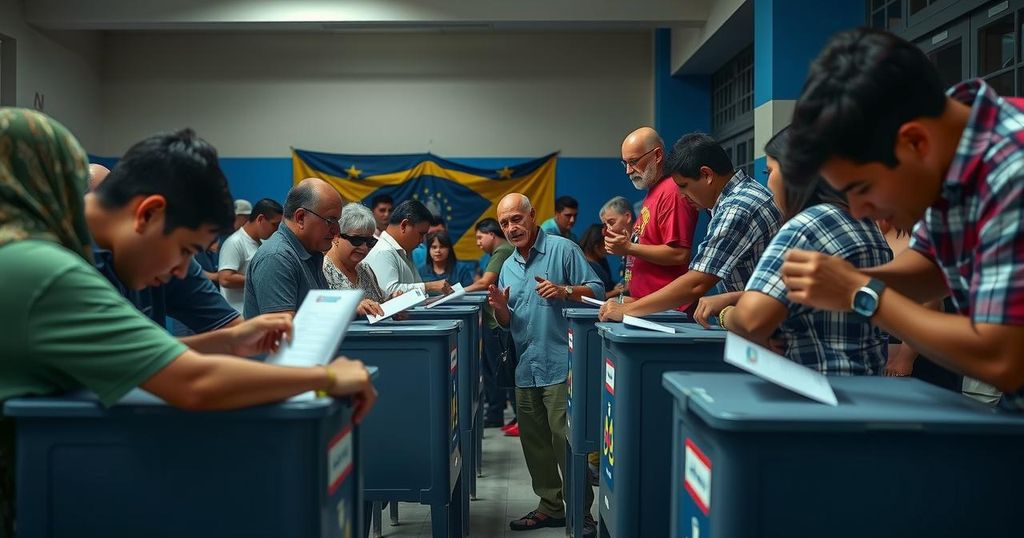Uruguay Engages in Decisive Presidential Run-off Election

Uruguay is conducting a presidential run-off election where leftist candidate Yamandu Orsi faces right-wing candidate Alvaro Delgado. Orsi, backed by former President Jose Mujica, aims to reclaim power after five years of conservative rule. Preliminary results are expected shortly after voting concludes, amid tight competition and rising economic concerns influencing voter sentiment in the nation.
Uruguayans are participating in a crucial presidential run-off election today, with the leftist Frente Amplio (Broad Front) candidate Yamandu Orsi, a former mayor, competing against Alvaro Delgado from the National Party, associated with the outgoing President Luis Lacalle Pou’s center-right coalition. Following a phase of right-wing governance lasting five years, the leftist bloc, led by former President Jose “Pepe” Mujica, seeks a return to control. Voting commenced at 8 am local time and will conclude at 7:30 pm, with preliminary results anticipated shortly thereafter.
The political landscape in Uruguay appears to be more moderate than in other Latin American nations, with only a slim margin of votes seen in recent opinion polls. Orsi obtained 43.9 percent in the initial round of voting, while Delgado secured 26.8 percent, aided by support from the Colorado Party. Each contender hopes to capture a portion of the 8 percent of voters who favored smaller, unaligned parties in the first round. Despite facing pressure from constituents regarding inflation and high living costs, both candidates have refrained from announcing any new pledges leading up to the election.
This year’s run-off presents a testing moment for Uruguay, presenting an opportunity for voters to weigh their options amidst rising dissatisfaction with current economic conditions. Key issues include public safety, employment, and wages, alongside an evaluation of the past five years of governance. Observers are keen to see if the Broad Front, despite its historical successes, can defy global trends impacting incumbent parties and reclaim authority in the country’s political arena.
When reflecting on the extent of this election’s significance, many voters express uncertainty about their choices. The election’s outcome may pave the way for the future political landscape of Uruguay, positioning the nation on the cusp of potential shifts in policy amidst a backdrop of widespread economic concerns.
Uruguay’s current election cycle is critically timed as it follows five years of right-wing leadership under President Luis Lacalle Pou. The country has a population of 3.4 million and has witnessed a relatively calm political arena compared to its neighbors, with significant overlap between left and right factions. However, current economic realities like inflation and high living costs generate considerable dissatisfaction among the populace, testing the resilience of ruling parties. This election serves as an important indicator of public sentiment in relation to incumbent governance and economic policy.
In conclusion, the presidential run-off in Uruguay marks a pivotal moment for voters as they decide between two contrasting political alliances. The outcome may signal a return to leftist leadership following a period of conservative governance, indicative of prevailing economic challenges faced by the population. The relatively tight race reflects a nuanced political atmosphere wherein voters are weighing their options against a backdrop of rising costs and dissatisfaction, a trend echoing across global democracies in recent years.
Original Source: www.aljazeera.com







